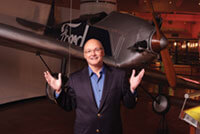Jeff DeGraff PhD’85: Dean of Innovation

Jeff DeGraff is shown at the Henry Ford Museum in Dearborn, Michigan, the site of his 2011 PBS special. The museum was created to chronicle the history of American innovation. “Second, it’s a place of incredible art but it’s art that’s accessible to normal people; it’s part of our lives. Finally, there is a very democratic sensibility that everyone belongs. I met people who were very encouraging when I started to put my work together. It made me a much better scholar.” Amy Longato/Detroit Public Television.
He advises U.S. Cabinet departments, state governments, and symphony orchestras, and his client list has included the likes of GE, Pfizer, Toyota, Coca-Cola, American Express, and 3M. He writes, teaches, lectures, and composes music.
Not bad for a fellow who considered retirement more than twenty years ago, only to decide “it was awful” when he realized that meditation, playing guitar, and reading self-help books went only so far.
Jeff DeGraff PhD’85 is the managing partner of the Ann Arbor-based consulting firm Competing Values and founder of the Innovatrium Institute for Innovation. He also teaches at Michigan’s Ross School of Business, but some may know him as the author of the book Innovation You, which presents a four-step program to “bolster your ingenuity and remake your life.” The book was featured in a PBS special in 2011.
DeGraff credits his success in connecting the dots between emerging technologies and traditional businesses to his “joyous experience” in Madison in the early 1980s. He loved Madison’s outdoor culture. “Even though I had no money, I lived on the lake,” he says. DeGraff also appreciated Madison’s art galleries and the “very democratic sensibility that everyone belongs.”
DeGraff sees no problem in translating ideas for business innovation into positive change for individuals.
“The key is to turn something that isn’t working into an opportunity to try something new,” DeGraff says. “Use the twenty-eighty rule. It’s easier to change 20 percent of your life [by] 80 percent, than 80 percent of your life [by] 20 percent. Remember to fail early and often off-Broadway. When you finally reach the big stage, you’ll be ready to perform.”
After receiving his doctorate in educational technology, DeGraff planned to join the University of Michigan’s medical school, but instead took a flier with an up-and-coming pizza company called Domino’s. His work as vice president of communications and new ventures helped to build Domino’s into a national name and earned him the nickname “Dean of Innovation.” Meanwhile, he was also serving on the advisory board of Apple.
“People have to be humble about being in the right place at the right time,” DeGraff says. “I could have been at a pizza company that ended up being a local business or a computer company that didn’t go anywhere.”
DeGraff eventually returned to academia to teach at Ross, but under the condition that he would conduct classes the way he wanted — in museums and other public spaces, for instance. He built courses around innovation and creativity before eventually starting Innovatrium, his “innovation laboratory.”
When he helped Reuters, the venerable British news service company, to “reinvent itself as a twenty-first-century media and information-services firm,” the first meeting was held in one of London’s old tram warehouses to keep the topic of change top of mind.
“If you want to become better and new, the positive tension that comes from diversity, people holding divergent views, is essential to making innovation happen,” he says.
True to his mission, DeGraff is not done growing. “I’ll see if I’m up to reinventing myself again,” he says.
Published in the Summer 2013 issue



Comments
Greg June 20, 2013
Jeff:
Fantastic lines: fail early and often off Broadway. That way when you reach the big stage you will be ready to perform. I will teach this lesson to my 14 year old until he gets it. I came from a family where failing was not permitted….ever. As a result, I never tried new things and stuck to safe old boring trails. I fell like I have missed a lot of opportunities and am in professional fields I should not be in.
I don’t want that for my 14 year old.
Great article!
Bridget September 4, 2013
I love this sage advice, “The key is to turn something that isn’t working into an opportunity to try something new.” Failure can seem so dead-end. DeGraff empowers with his words.
Bridget